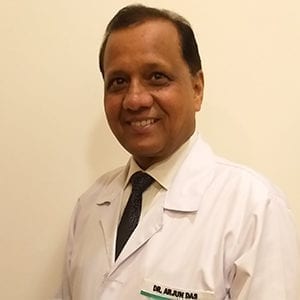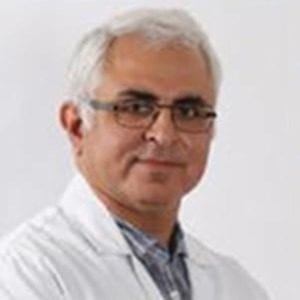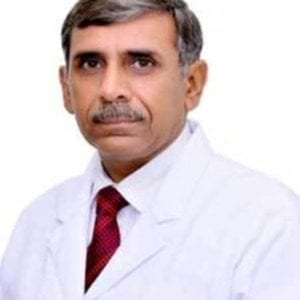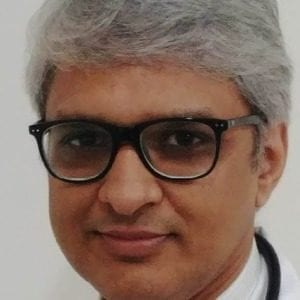Best Doctors in India for Alcoholic Hepatitis Treatment
- ENT surgeon, Chandigarh, India
- Over 25 years’ experience
- Max Hospital Mohali
Profile Highlights:
- Dr. Arjun Dass is an esteemed ENT specialist currently practicing at Max Healthcare. With a distinguished career spanning several decades, he has held prominent roles, including serving as the Professor & Head at Govt. Medical College & Hospital, Chandigarh from 1997 to 2020. His previous positions include Associate Professor and Assistant Professor at Maulana Azad Medical College (MAMC), New Delhi, and roles at AIIMS, New Delhi.
- Dr. Dass’s specializations include Otology, Rhinology, and Head & Neck Oncology. His contributions to the field have been recognized with a Certificate of Commendation from the Chandigarh Administration and the GNA Gudzer Oration Award.
- Cardiologist, Gurugram, India
- Over 20 years’ experience
- Narayana Superspeciality Hospital, Gurugram
Profile Highlights:
- Dr. Hemant Madan is an experienced and accomplished cardiologist, with a professional experience of around 20 years.
- His expertise includes all aspects of cardiology, including pediatric cardiology, complex coronary interventions, device implantation, all kinds of rhythm disorders, percutaneous treatment of valve stenosis, and peripheral interventions.
- Dr. Madan pursued his Fellowship at the Royal College of Physicians from Edinburgh in UK.
- Radiation Oncologist, Gurugram, India
- Over 20 years’ experience
- Narayana Superspeciality Hospital, Gurugram
Profile Highlights:
- Dr. Indu Bansal Agarwal is the Director and Senior Consultant in the Department of Radiation Oncology at Narayana Superspeciality Hospital, Gurugram.
- Dr. Indu Bansal Agarwal is extremely skilled in high-end techniques such as SRS, FSRS, IMRT, intraluminal, and interstitial brachytherapy. Her special areas of interest are Pediatric tumors, Central Nervous System Tumors, and Breast, Head and Neck Cancers.
- Dr. Indu Agarwal has co-authored chapters of several books and also has numerous publications to her credit in National and International Journals.
- Cardiac Surgeon, Gurugram, India
- Over 15 years’ experience
- Narayana Superspeciality Hospital, Gurugram
Profile Highlights:
- Dr. Rachit Saxena is an experienced cardiac surgeon, who is known for his extreme dedication to his profession, and for providing absolute patient satisfaction.
- Supported by an efficient cardiac surgical team, Dr. Saxena is known for successfully managing the most complex of cardiac surgical problems.
- Dr. Rachit Saxena is known especially known for the capability to perform cardiac surgery with minimal blood requirement and ensure early mobilization and return to work.
- Medical Oncologist, Gurugram, India
- Over 20 years’ experience
- Narayana Superspeciality Hospital, Gurugram
Profile Highlights:
- Dr. Randeep Singh has trained extensively in managing cancer patients at the prestigious Tata Memorial Hospital, Mumbai.
- After spending over 20 years in this field, he has a vast experience in breast, lung, and gastrointestinal cancers.
- Throughout his career, Dr. Randeep Singh has had over 40 publications in national and international journals.
- He has also attended and presented various scientific papers in national and international journals.
- Surgical Oncologist, Gurugram, India
- Over 20 years’ experience
- Narayana Superspeciality Hospital, Gurugram
Profile Highlights:
- Dr. Rashmi Sharma is a trusted and experienced surgeon with excellent communication skills and a long history of successfully diagnosing and treating her patients.
- With over 20 years of experience in Breast Care, she has also previously served in other healthcare facilities including Moolchand Hospital and Max Hospital Saket.
- Cardiovascular Thoracic Surgeon, Gurugram, India
- Over 27 years’ experience
- Max Super Specialty Hospital, Saket, New Delhi
Profile Highlights:
- Dr. Sandeep Singh is an esteemed cardiac surgeon with over three decades of experience in Cardio-Thoracic and Vascular Surgery (CTVS).
- He currently serves as the Senior Director and Head of CTVS at Max Healthcare.
- Dr. Singh’s educational background is equally impressive, with an MBBS and MS in General Surgery from S.N. Medical College, Agra, and an M.Ch. in CTVS from the L.P.S. Institute of Cardiology, Kanpur.
- Liver Transplant Surgeon & HPB Surgeon, Gurugram, India
- Over 20 years’ experience
Profile Highlights:
- Dr. Sanjay Goja is known for being the first Indian surgeon to perform Robotic Hepatectomy.
- Dr. Sanjay Goja has performed over 1000 liver transplant surgeries, as well as over 500 hepatobiliary procedures as a primary surgeon.
- He is an active member of various organizations such as the Association of Surgeons of India, American College of Surgeons, Indian Association of Gastrointestinal Endo Surgeons, International Liver Transplant Society, etc.
- Surgical Oncologist, Gurugram, India
- Over 10 years’ experience
Profile Highlights:
- Dr. Shilpi Sharma is a highly experienced surgeon and oncologist who has previously worked in prestigious institutions such as Tata Memorial Hospital, and National Cancer Institute.
- Throughout her career, she has conducted various high-quality research in the field of head and neck cancers. Dr. Shilpi Sharma has also been part of various randomized and nonrandomized trials and has also been involved in clinical and translational research.
- She is also a member of ICMR guideline committee which formulated the ICMR guidelines on tongue cancers.
- Cardiologist, Gurugram, India
- Over 20 years’ experience
Profile Highlights:
- Dr. Vivek Chaturvedi is a highly experienced and acclaimed cardiologist with over 20 years of experience.
- He has performed more than 2500 cardiac ablations, several of them for complex arrhythmias like atrial tachycardia, ventricular tachycardia, VPC, and atrial fibrillation using the latest technology like 3D Electroanatomic mapping.
- He has more than 50 publications in international journals & books.
Best Hospitals in India for Alcoholic Hepatitis Treatment
ALCOHOLIC HEPATITIS
Alcoholic hepatitis is a liver infection, which is mainly caused by frequent, heavy use of alcohol. Fat can build up in the liver cells, which might lead to inflammation as well as scarring of the liver.
Alcoholic hepatitis might be mild or severe. A patient might even need a liver transplant if proper treatment is not provided, or if they don’t stop consumption of alcohol.
It is also notable that all heavy drinkers don’t develop this condition, and sometimes this condition even develops in people who drink moderately. However, if you are diagnosed with this condition, it is important for you to quit drinking alcohol. People who continue drinking alcohol might face a huge risk of serious liver damage as well as death.
Symptoms
Depending on the amount of damage to the liver, the symptoms can vary. If you are having a mild form of the disease, you might not even experience any symptoms at all. However, as the damage continues to grow, you might experience the following:
- Changes in appetite
- Dry mouth
- Weight loss
- Pain or swelling in the abdomen
- Jaundice, or yellowing of the skin or eyes
- Fever
- Nausea and vomiting
- Easy bleeding or bruising
- Changes in your mental state, including confusion
- Fatigue
The symptoms of this condition are similar to those caused by a few other health conditions. Therefore, if you develop any of these symptoms, it is best to get a proper diagnosis as well as begin treatment.
Causes & risk factors
Alcoholic hepatitis generally develops when the alcohol you drink causes damage to your liver. However, it is not clear why alcohol does this damages only to some heavy drinkers.
Few factors that are known to play a role in this condition include:
- The body’s process that breaks down alcohol produces some toxic chemicals
- These chemicals can trigger inflammation that can destroy the liver cells
- Thus, over time, scars replace healthy liver tissue, thus interfering with the function of the liver
- This irreversible scarring, which is also termed cirrhosis, is the final stage of alcoholic liver disease
If you have hepatitis C and continue to drink, even moderately, you are more likely to develop cirrhosis.
Some heavy drinkers are also malnourished because they don’t eat a proper balanced diet. Alcohol and its byproducts also prevent the body from absorbing nutrition properly. Lack of nutrition can contribute to liver cell damage.
Some other risk factors that can lead to this condition include:
- Your sex- Women are usually at a higher risk of developing alcoholic hepatitis since the way alcohol is processed in women is different.
- Binge drinking- Having over five drinks within two hours for men and four or more for women can increase the risk of alcoholic hepatitis.
- Obesity- Heavy drinkers who are overweight are also more likely to develop alcoholic hepatitis and to progress from that condition to cirrhosis.
- Race and ethnicity- Hispanic and Negroid people might be at higher risk of alcoholic hepatitis.
- Genetic factors- According to studies, there may be a genetic component in alcohol-induced liver disease. However, it is difficult to separate genetic and environmental factors.
Diagnosis
If you are showing symptoms of alcoholic hepatitis, your doctor will first inquire about your medical history and alcohol consumption. Next, he/she will perform a physical exam to see if you have an enlarged liver or spleen. They might also need a few more tests to confirm your diagnosis, such as:
- Complete blood count (CBC)
- Liver function test
- Ultrasound of the liver
- Abdominal CT scan
- Blood clotting tests
In some cases, a liver biopsy might also be needed to confirm the diagnosis of alcoholic hepatitis. A liver biopsy requires your doctor to remove a tissue sample from your liver, which is then tested in the lab. This method helps to show the severity and type of liver disease.
Treatment
Stopping alcohol consumption is the most important treatment for alcoholic hepatitis. There is no cure for this condition, but treatment can help in reducing or eliminating symptoms, or stopping its progression.
It is also important to note that scarring of the liver is permanent, but treatment can aim to restore as much function as possible.
Dietary changes
Medication
Liver transplant
The best hope of recovery is to be aware of the signs and symptoms as well as to reduce, manage, or if possible, completely stop consumption of alcohol.
Complications
Alcoholic hepatitis might lead to severe other complications such as:
- Enlarged veins (varices)- In this condition, blood that is unable to flow freely through the portal vein, can back up into other blood vessels in your esophagus or stomach.
- Hepatic encephalopathy- This condition can be caused by the buildup of toxins if your damaged liver is unable to remove all the toxins from your body. It involves confusion, drowsiness, and slurred speech.
- Ascites- Ascites is a condition in which the fluid that accumulates in the abdomen may get infected and thus, require treatment with antibiotics. Although this condition is not life-threatening, it can be a sign of advanced alcoholic hepatitis, or cirrhosis.
- Kidney failure- A damaged liver affects blood flow to the kidneys, thus resulting in kidney failure.
- Cirrhosis- The scarring of the liver might lead to liver failure.
Prevention
Alcoholic hepatitis might be prevented if you take the following steps:
- Drink alcohol in moderation, if at all- For healthy adults, moderate drinking means no more than one drink a day for women of all ages and men older than 65, and not over two drinks a day for men aged 65 and younger. However, if you prevent all alcohol, it is a certain way to prevent this condition.
- Check before mixing medications and alcohol- Ask your doctor if it’s safe to drink alcohol while you are taking medications. Consider reading the warning labels on over-the-counter medications as well. Don’t drink alcohol when you are taking medications that warn of complications when combined with alcohol.
- Protect yourself from hepatitis C- Hepatitis C is an infectious liver disease that is caused by a virus. If it is left untreated, it may lead to cirrhosis. If you are having hepatitis C and you consume alcohol, you’re generally more likely to develop cirrhosis than if you don’t drink.















